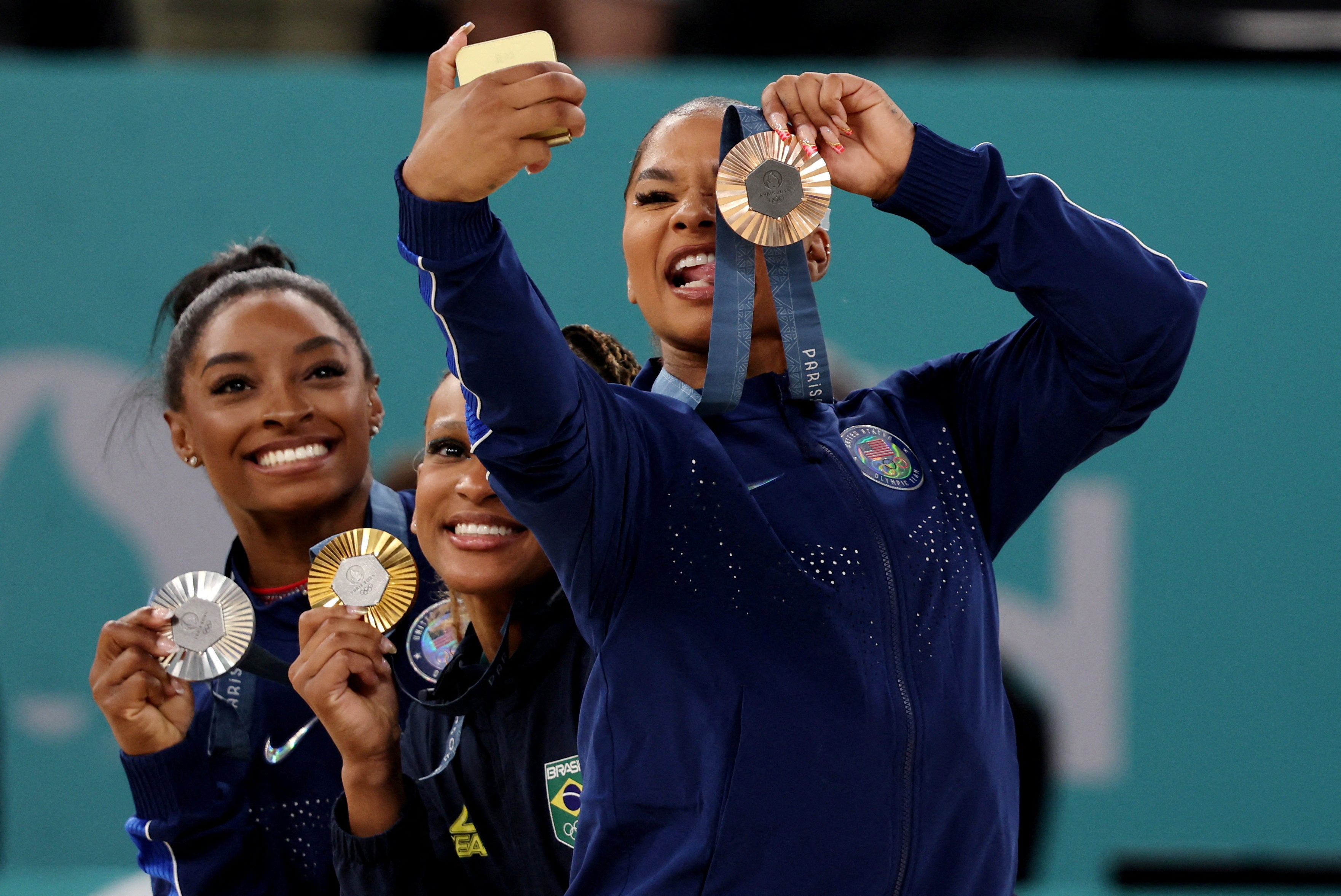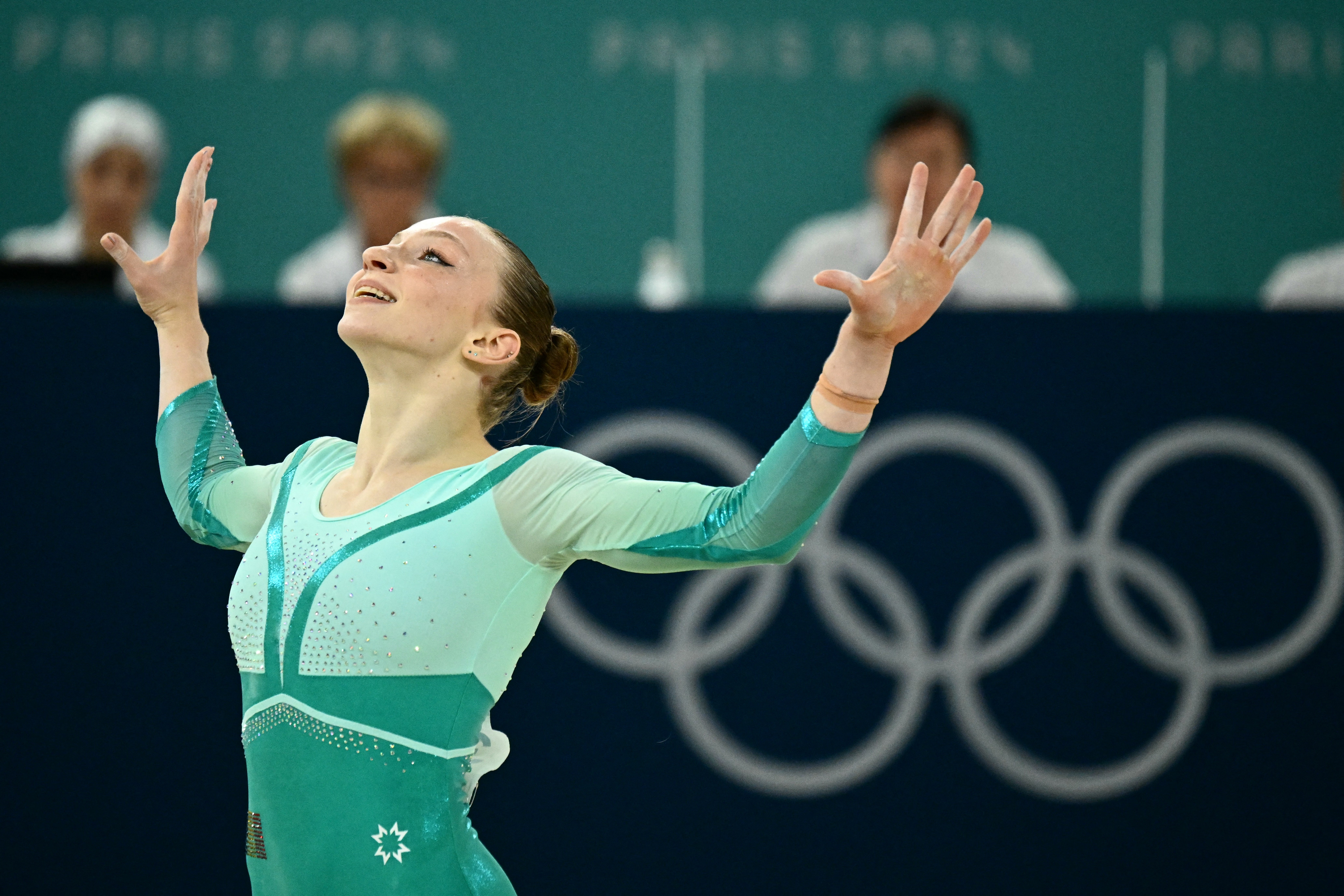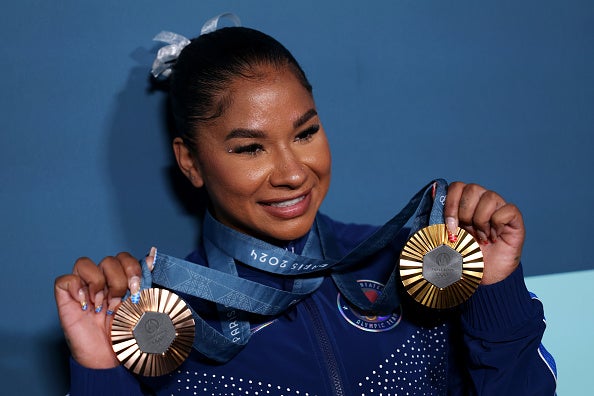The Olympics may be over but the recipient of one bronze medal from Paris 2024 appears to still be in doubt as debate continues over the rightful third-place finisher in the women’s gymnastics floor final.
Jordan Chiles of the United States had been presented with the medal and stood on the podium alongside teammate Simone Biles and Brazilian gold medallist Rebeca Andrade after the final session of gymnastics on Monday 5 August.
A week on, though, Chiles has been stripped of her medal by the Court of Arbitration for Sport (Cas) with Romania’s Ana Barbosu instead awarded bronze.
But the saga appears far from an end — USA Gymnastics submitted fresh video evidence to Cas that it claimed proved Chiles should keep her medal, though Cas has said it will not reconsider the ruling.
Here’s how a strange story has unfolded.
What happened during the floor final?
With Andrade and Biles clear in gold and silver after their floor routines, Romania’s Ana Barbosu occupied the final medal position with a score of 13.700 points and Chiles the last gymnast to compete in the final.
In gymnastics, entrants are awarded a score for both difficulty and execution, with their total a combination of the two figures subject to any penalties. Barbosu received a difficulty score of 5.8 and an execution tally of 8.000, though lost 0.100 for straying outside of the floor area.
Chiles produced a good routine and looked to have done enough to secure a medal having not received any penalties but the judges awarded her only 7.866 for execution and 5.8 for difficulty. That left her just short of the Romanian on 13.666, and down in fifth overall.

Up flashed the results showing Barbosu as the bronze medallist — but the 18-year-old’s joy was brief.
Gymnastics allows teams to submit an inquiry if they believe a difficulty score has been enter incorrectly. Unlike in diving, tariffs are not set pre-competition, and the United States felt that Chiles’ routine had been undermarked.
After review, the judges upped her score to 5.9, enough to lift her into bronze-medal position and take Barbosu’s place on the podium.
So why did this result not stand?
Olympic rules require an inquiry to be submitted within 60 seconds of the score being awarded. Barbosu and Romania appealed to Cas that Cecile Landi (head coach of Team USA’s gymnastics squad) had failed to do so, instead requesting the review of the score four seconds beyond the strict deadline.
On August 10, five days after the final, Cas determined that Landi had indeed been late in submitting her inquiry and thus reinstated the initial result. The International Olympic Committee (IOC) upheld this decision and ordered Chiles to return her bronze medal for reallocation to Barbosu.

A separate appeal surrounded Barbosu’s teammate Sabrina Voinea, who was penalised for stepping out of bounds during the competition despite appearing not to have done so. This appeal was rejected by Cas.
Why did USA Gymnastics submit new evidence?
The US Olympic and Paralympic Committee (USOPC) immediately suggested an intention to appeal the decision at Cas — an appeal could, in theory, be submitted to Switzerland’s highest court, the Swiss Tribunal, or the European Court of Human Rights, though it is not clear the exact process by which this would work.
Instead, USA Gymnastics challenged Cas by saying that it was not “given adequate time or notice to effectively challenge the decision”. On Sunday came a fresh twist with the body suggesting that it had unearthed video evidence that conclusively proved that Landi had made her inquiry within the one-minute time limit.

“The time-stamped video shows Landi first stated her request to file an inquiry at the inquiry table 47 seconds after the score was posted, followed by a second statement 55 seconds after the score was originally posted,” USA Gymnastics said in a statement.
Cas has subsequently said that rules do not allow for an arbitral award to be reconsidered, even when new evidence is presented.
USA Gymnastics responded by saying they were “deeply disappointed” by the decision and vowed to “pursue every possible avenue and appeals process.”
What has the reaction been from the athletes?
Chiles posted on her Instagram story after Cas’ ruling with four broken heart emojis and indicated that she would be taking a break from social media for her mental health.
Teammate and silver medallist Biles posted on Instagram: “Sending you so much love Jordan. Keep your chin up ‘Olympic champ’ we love you.” Fellow American gymnast Sunisa Lee described the saga as “completely unacceptable” and questioned the role of the judges in creating the situation.
Romanian great Nadia Comaneci — who in 1976 became the first gymnast to be awarded a perfect 10 at the Olympics — initially criticised the score change that denied her compatriot a medal. “I can’t believe we play with athletes mental health and emotions like this,” Comaneci posted on X. “Let’s protect them.”

After the Cas ruling, Comaneci added: “To all the fans around the world please stop attacking these young ladies… it is unacceptable and cruel.”
Barbosu, meanwhile, made clear on returning to Romania that her issue was not with Chiles or the United States but the scoring system and decision of the judges to allow the appeal. “I only want for everybody to be fair, we don’t want to start picking on other athletes of any nationality,” Barbosu said.
“We as athletes don’t deserve something like that, we only want to perform as best as we can and to be rewarded based on our performance. The problems lie with the judges, with their calculations and decisions.”

